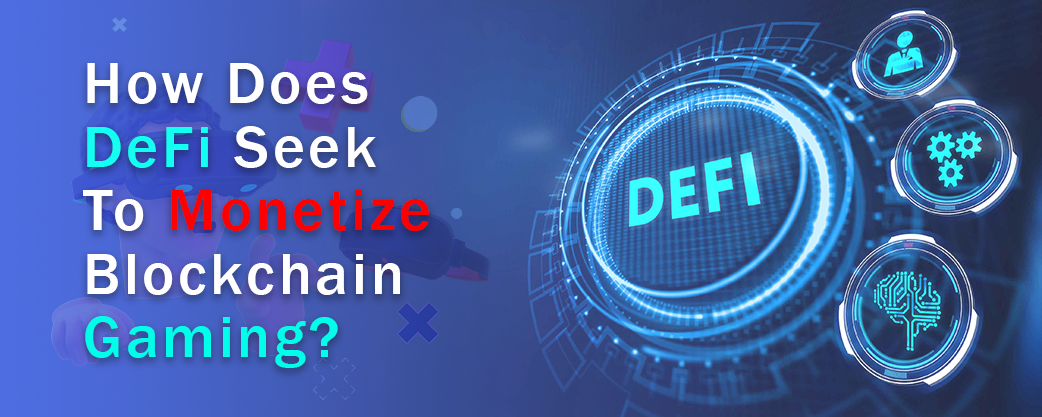
How Does DeFi Seek To Monetize Blockchain Gaming?
Decentralised finance has changed many industries for years, and the gaming sector is no exception. Decentralised Finance, often known as DeFi, is currently having an impact on the gaming sector. Decentralised Finance is well recognized for revolutionising the financial ecosystem.
The gaming business has been expanding at an extraordinary rate over the past few years, and in the next five years, it is expected to reach over $300 billion. There are currently an estimated 2.6 billion active players who make roughly $173 billion in income. Experts believe that the adoption of DeFi could increase these figures.
What is Blockchain Gaming?
The gaming industry was initially characterised by consumers looking to have fun online and business owners profiting from their actions. Games based on blockchain technology are available in blockchain gaming.
Prior to the advent of blockchain games, players had to purchase internal gaming assets in order to move about the gaming world. Players can buy, sell, or trade commodities like weapons, avatars, or their accumulated wealth in the games' marketplace. However, in the majority of games, the money received never really goes to the players.
The games were developed by the game developers (a concentrated monopoly) exclusively for their own financial gain. Furthermore, the gaming infrastructure has serious flaws, including a lack of transparency and an inability to change the game's mechanics.
Fast-forward to the advent of blockchain-based games that have reorganised the monology and divided the spoils equally between the two parties. Blockchain's decentralised structure now allows gamers control over their gaming experience. This, notably, transcends the virtual realm.
Through an invention known as non-fungible tokens, players may now own and manage their in-game assets in real life (NFTs). These games also support interoperability, multichain trade, and record transparency, which creates a fair gaming environment.
Are blockchain games a source of income?
It has
already been mentioned that blockchain games have two distinctive features:
the use of NFTs and the incorporation of cryptocurrencies for in-platform payments. Users may possess unique assets in games that employ NFTs, which they can trade with other players in the same game or migrate to different platforms.
By engaging in marketplaces, you can earn as much money playing blockchain games as you would in the real world. For instance, gamers with a creative streak and a desire for compensation could create and sell memorabilia. Though the gaming industry is still in its infancy, the future seems promising.
Benefits of Blockchain Gaming
1. Interoperability is supported by it. Blockchain tokens link in-game items, enabling players to trade them on gaming exchanges run on various blockchain networks.
2. Blockchain develops an open, distributed, and visible ecosystem that offers a fair gaming setting. Through a voting system, players can select what changes should be made to the game. Blockchain also gets rid of cheats who disrupt the game for everyone else.
3. A typical centralised game's creator has complete control over when to terminate the game. But with the blockchain game, even if the game's creator decides not to continue, the game will continue with the help of the other players and can be expanded with new plotlines.
4. Blockchain-based games give them real ownership. The in-game assets are controllable by players in real time.
One of the earliest blockchain games to introduce blockchain technology into popular games was Cryptokitties. It gained popularity after its 2017 release. Players would create, buy, and sell virtual cats in this game. The cost of the kittens would increase with how special they were.
Games And Money
You can make money playing games on the blockchain using NFTs and the integration of cryptocurrencies. Players in games made up of NFTs possess special in-game items that they can exchange with other players in the same game or on any NFT marketplace.
Participating in the market is an additional way to make money with blockchain. For instance, gamers occasionally want a reward and frequently sell or buy gaming collectibles.
Defi Monetizing The Games
One of the most popular subsets of cryptocurrency is decentralised finance. In the upcoming years, it is anticipated that the gaming business would spend billions more money. As more and more people join in the fun, game producers, developers, and gamers are all searching for methods to make money from the games.
Games on the blockchain will be the most effective way to monetize these services. In the games, players must perform particular duties. Tokens are mined after they finish their responsibilities. The game's obtained tokens are transmitted using Defi protocols.
In the cryptocurrency industry, Decentralised Finance (DeFi) has experienced rapid expansion. More than 2 billion people worldwide are estimated to play games. Furthermore, it is estimated that this spending will reach $256 billion by 2025.
Gamers and game developers are looking for effective ways to monetise the gaming industry as more people turn to entertainment. Blockchain games, like decentralised online video games, may make this revenue creation possible. Tokens are "mined" by players through achieving in-game objectives.
To send the tokens you win from playing the games, you must use Defi protocols. Additionally, owners of cryptocurrency games will likely expect a positive return on their positive investment (Return On Investment).
Conclusion
Games on the blockchain have made it possible for players to earn from traditional games. The two methods are NFTs or cryptocurrencies. As the DeFi protocol is used to transmit tokens obtained during the game, DeFi is eager to make money off of all these blockchain games. Blockchain games have a bright future because of the enormous potential for financial advantages for their players. They only need to adhere to a safe and open process to the fullest.
Hope you like the blog if you do please share it with your friends and colleagues who are interested in gaming and blockchain technology.
By Akhilesh Kumar Yadav












